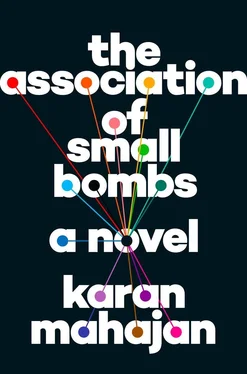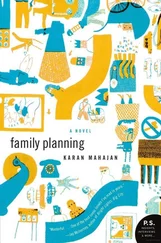Afire with nervous tics, they came out of the car. Shockie smoothed his hair, Meraj put on his dark glasses, and Taukir dusted off his tight black jeans.
Quite suddenly, a man appeared before them. “You can’t park here,” he said.
“Sir?” said Shockie.
“My son has to park his car here.” The man was the owner of Shingar Dupatte — a short bald fellow with a mustache and a granitic head that appeared to hold every shade of brown.
“And who’s your son — the king of Delhi?” Taukir asked.
“Come on, it’s OK,” Shockie said.
At first he was appalled that Taukir would risk searing himself into the man’s memory with an argument, but later he was grateful: Taukir had behaved as any rude Delhiite would, and besides, they were disguised.
Now, getting back into the car and reversing it, Shockie said, “Next time be quiet.” This was already the worst mission he’d ever been on, he decided; his mind swarmed with images of the police, of torture, of life coming to a sudden end in Delhi. The only way out was to park close enough to Shingar Dupatte so that the nosy, rude proprietor — and his son — were killed. “You guys get out now and I’ll park. That guy is going to come after us again and ask us to move.”
They did as he instructed, and Shockie maneuvered the car in front of a framing shop.
Within the shop, he caught sight of oil paintings of mountains — things yellowy and oozy with paint; a golden Ganesh; a Christ on a cross; a Rajasthani village woman. It was like a flashback a man might have as he dies, all the odd significant objects swirling into view over the heads of humming, commercially active humans.
He parked, jumped out, and walked away. He pressed a small jerry-rigged antenna in his hand and activated the timer, set to go off in five minutes. The proprietor of the framing shop looked at him but Shockie smiled and waved back — as if he were a regular customer — and the man, seated fatly behind a counter, one of those counters that have a money drawer, looked confused and then smiled and waved back.
________
Shockie walked away from the central square. “Don’t look; keep moving,” he told the other men as he came across them in an alley. After a while they made it to the main road.
But the market — the market was noisy in its normal way. There was no disruption, no blast, nothing. “Shit,” Shockie said. “But let’s wait.”
They threaded their way through the dark alleys, sweating, bad-breathed, anxious, melting in the heat. “It must be the cylinder,” Shockie said finally, realizing the bomb had not gone off. “Let me go back and get it,” he said. “Something must have gone wrong.” He was ashamed. The eyes of his comrades were on him. Failure was failure — explanations solved nothing. His bravado had been for naught.
“We’ll come,” Meraj said.
“You should have helped when it was needed,” Shockie said. “Now what’s the point?”
“What if it goes off when you get in?” asked Taukir.
“Then do me a favor and say I martyred myself purposely.”
________
The car was still there when he went back. For effect, he entered the framing shop. “How are you?” he said, bringing together his palms for the proprietor.
“Good, good. Business is fine — what else can one want?”
The proprietor was fair and doggish, with worry lines contorting his forehead. He had a serious look on his face, as if being surrounded by so many frames had made him conscious of being framed himself, of being watched.
Shockie went back to the car. As he turned the ignition, there were tears in his eyes. Instinctively preparing himself, he put a palm over his dick.
So this was how it would end. Pulling the gears, he backed out of the spot.
________
“I know what went wrong,” Shockie said, when they were back in Taukir’s house.
“What?” said Taukir, now feeling much closer to Shockie.
Shockie pointed to the yellow wires that he’d clipped from the contraption in the bonnet, picking them up in a loop the way one may pick up a punished animal by the ears. They had frayed in the heat.
“Let’s just go tomorrow and try again,” Meraj said irritably. He just wished the mission to be over.
“We can’t,” Taukir said. “The market is closed on Mondays. But Tuesday is a big day because it’s the day after it’s closed.”
“We better send a message back to base,” Meraj said sleepily. “The election is in four days.” The bomb in Delhi was meant to be a signal to the central government about the elections they were organizing in Kashmir.
“Tell them that it was a wiring problem,” Shockie replied. “They’ll understand.”
But Shockie was chastened. They were all chastened and disappointed with each other. Like men who have failed together, they wanted nothing more than to never see each other again.
________
On Tuesday, Shockie went alone to the market. But there was no pleasure in it. It was all anticlimax. And he could see the faces of the framing shop owner and the owner of Shingar Dupatte, how they would react when the bomb went off; and he felt sad, the way one always did when one knew the victims even a little.
After the blast, Shockie returned to Kathmandu, retracing his steps, reading the news whenever he could.
The Times of India featured a picture of a blasted stray dog.
When Shockie got back to the base in Nayabazar — he had separated from Taukir and Meraj, who had gone elsewhere, into hiding — he was surprised to find himself embraced as a hero. “You killed two hundred,” Masood said. “God bless you.”
“It was more like fifty,” Shockie said, immediately disgusted by his own lie. He tended to believe the Indian papers on this subject. They had no incentive to play down the horrors.
“Our reports say a hundred at a minimum,” Masood said.
Shockie did not say anything further.
It was only when he went out for a walk later with his friend Malik that he burst out, “I’m thinking of defecting.”
“Tell me why,” Malik said, exhaling deeply.
Once Shockie started, he couldn’t stop. He felt the leadership of the group was corrupt and in denial, prone to inflating figures to get more funding; that they were siphoning money to build big houses for themselves and sending their children abroad but not providing even the minimum for blasts in Delhi — why else had only thirteen died? — that they were ideologically weak, not realizing that one big blast achieved much more, in terms of influencing policy, than hundreds of small ones; that one of the militant leader’s sons was studying in England — granted, Ramzi Yousef had also studied in Swansea, Wales, but then he was from a rich Kuwaiti-Baluchi family….
But mostly Shockie felt there was no innovation when it came to bombs.
“You just have a habit of complaining,” Malik said.
“That’s not true.”
“It’s true, yaar. Even if the blast had been huge, you would have complained. Now, what do you want? That the whole country fall to its knees? This isn’t America, bhai. There the people are rich and they wait excitedly for tragedy. You set off a small pataka and they cry.” Malik hadn’t been to the U.S., but he was a big reader, and this fluent authority brought tears of satisfaction to his eyes. “Whereas a city like Delhi — what can you do?”
“We could try Parliament, like I told Abdul.”
“Leave the Parliament. There’s too much security.”
“What about Teen Murti or IIC? FICCI. World Trade Center. Oberoi.”
“You are not getting my point,” Malik said, shaking his head. “Delhi is a Muslim city, with a Muslim history and Muslim monuments. If you want to shake people, you have to attack Muslim targets. It makes our decision to attack harder. And when you look at the new construction, it’s all Punjabi and awful. No one cares if it falls.” Happy with this irony, he smiled broadly.
Читать дальше












